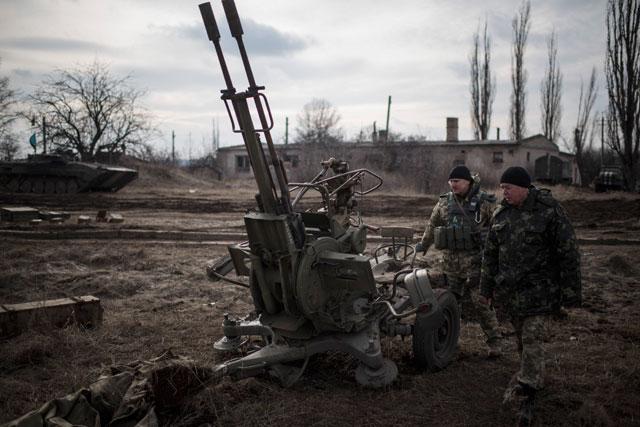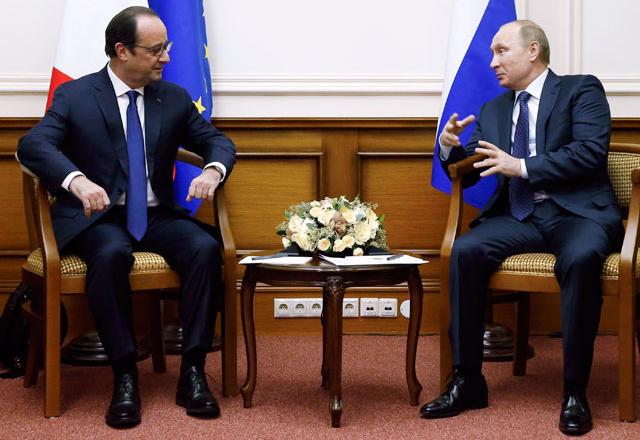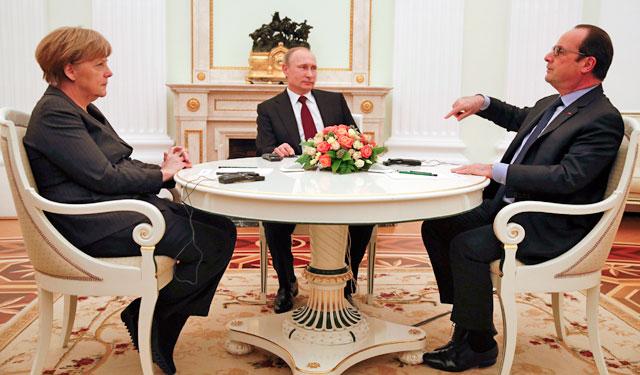You are here
Four-way emergency Ukraine summit planned for Wednesday
By AFP - Feb 08,2015 - Last updated at Feb 08,2015

KIEV — The leaders of Ukraine, Germany and France are pushing for a summit with Russian President Vladimir Putin on Wednesday in a frantic bid to halt escalating bloodshed in eastern Ukraine.
The four leaders discussed the meeting in a phone call Sunday as part of their efforts to achieve a "comprehensive settlement" in the conflict between Ukrainian forces and pro-Russian rebels, Berlin said.
Putin, however, warned that the summit planned in the Belarussian capital Minsk would only take place if the leaders agreed on a "number of points" by then.
"We will be aiming for Wednesday, if by that time we manage to agree on a number of points which we've been intensely discussing lately," Putin told Belarus President Alexander Lukashenko Sunday in televised remarks.
German Chancellor Angela Merkel and French President Francois Hollande have ramped up their push for peace in recent days, jetting to Kiev first for talks with Ukrainian President Petro Poroshenko and then to Moscow to meet Putin, accused by the West of masterminding the 10-month-old conflict.
On Monday, foreign ministry officials from the four countries will hold preparatory talks in Berlin while Merkel briefs US President Barack Obama on the latest peace initiative during a visit to the White House.
In their telephone conversation Sunday, Putin, Poroshenko, Merkel and Hollande "continued to work on a package of measures to achieve a comprehensive settlement of the conflict in eastern Ukraine”, Merkel's office said.
The Ukrainian government said the leaders expected their efforts to lead to "an immediate and unconditional bilateral ceasefire".
On Tuesday, mediators from the Organisation for Security and Co-operation in Europe are expected to meet with Ukrainian and Russian representatives as well as the rebels, Ukraine's presidency said.
Fresh fighting in the former Soviet republic claimed 12 civilian lives, separatist and Kiev authorities said, with 12 Ukrainian troops also killed in the last 24 hours.
A previous peace deal agreed in Minsk in September has been largely ignored, with fighting escalating in recent weeks as the rebels push further into government-held territory.
French Foreign Minister Laurent Fabius told the Munich Security Conference that "what Germany and France are seeking right now is not peace on paper, but peace on the ground”.
European Union foreign ministers meeting in Brussels Monday are to confirm the addition of 19 people to a list of EU sanctions over the conflict in Ukraine.
'Additional' US assistance
In Washington, momentum has been building for the US to arm Ukraine against the separatists.
Speaking in Munich US Secretary of State John Kerry dismissed talk of a rift with Europe on the issue.
"Let me assure everybody, there is no division, there is no split," Kerry said.
"We all agree that this challenge will not end through military means [but] the longer it takes, the more the off-ramps are avoided, the more we will be forced to raise the costs on Russia and its proxies," he said.
German Foreign Minister Frank-Walter Steinmeier said a resolution of the conflict was still far off.
"Europe can only have permanent security with, not against Russia," said Steinmeier.
A senior State Department official has said the new European peace plan is based on September's ceasefire deal.
Hollande told French TV station France 2 that the proposal includes the creation of a 50- to 70-kilometre demilitarised zone around the current demarcation line.
But this idea appeared to face opposition from Ukraine's president, who has lost territory to the rebels since the Minsk accord. "There is only one line, and that's the line from the Minsk agreement," Petro Poroshenko said.
Russian Foreign Minister Sergei Lavrov said that the Kremlin was expecting "important decisions" to be taken if the leaders' summit went ahead on Wednesday.
Moscow's top diplomat played up the reported divisions between the US and Europe on arming Ukraine.
"An overwhelming majority if not all European politicians think this is a bad idea," he said in Munich.
Some 5,400 people have been killed since the start of the conflict in April.
Related Articles
French President Francois Hollande said after an impromptu visit to Russia for crisis talks with Vladimir Putin on Saturday that a ceasefire could take hold in eastern Ukraine in the next few days.
Western leaders challenged Russian President Vladimir Putin Saturday to prove he wants peace in Ukraine, warning both sides a new Franco-German peace drive may be a "last chance" to stop all-out war.
US President Barack Obama made clear he was some way from a decision on whether to arm Ukraine in its conflict against Russian-backed rebels, saying on Monday he still hoped for a diplomatic solution.


















